
-
 Musk draws ire because 'isn't left-wing': Italy's Meloni
Musk draws ire because 'isn't left-wing': Italy's Meloni
-
Jimmy Carter honored at state funeral as US mourns

-
 Lebanon army chief Aoun becomes president after two-year void
Lebanon army chief Aoun becomes president after two-year void
-
Sarkozy tells court 'not a cent' of Libyan money in campaign funds

-
 Boniface out, Xhaka doubtful for Leverkusen's trip to Dortmund
Boniface out, Xhaka doubtful for Leverkusen's trip to Dortmund
-
What we know about the LA fires

-
 Clashes as crowds welcome Mozambique opposition leader home from exile
Clashes as crowds welcome Mozambique opposition leader home from exile
-
Aldcroft named England captain ahead of 2025 Women's Rugby World Cup

-
 Ukraine's leader calls for support as Trump's return opens 'new chapter'
Ukraine's leader calls for support as Trump's return opens 'new chapter'
-
Polish president says don't arrest Netanyahu at Auschwitz ceremony

-
 Ex-Scotland rugby captain Hogg spared jail after admitting he abused wife
Ex-Scotland rugby captain Hogg spared jail after admitting he abused wife
-
37 killed in north Syria clashes between pro-Turkey, Kurdish forces: monitor

-
 Italy's Meloni denies discussing SpaceX deal with Musk
Italy's Meloni denies discussing SpaceX deal with Musk
-
Wolves sign Ivory Coast defender Agbadou from Reims

-
 Lebanon army chief short of required majority in first round of president vote
Lebanon army chief short of required majority in first round of president vote
-
Beijing says EU imposed unfair trade barriers on Chinese firms

-
 Global stock markets mixed tracking US rates outlook
Global stock markets mixed tracking US rates outlook
-
West Ham appointment feels like 'Christmas' says new boss Potter

-
 Thousands welcome Mozambique opposition leader as he returns from exile
Thousands welcome Mozambique opposition leader as he returns from exile
-
US emissions stagnate in 2024, challenging climate goals: study
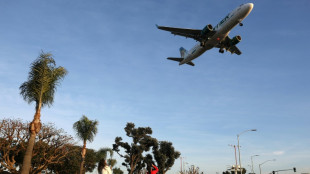
-
 China's electric and hybrid vehicle sales jump 40.7% in 2024
China's electric and hybrid vehicle sales jump 40.7% in 2024
-
UK FM Lammy refuses to condemn Trump comments on Greenland

-
 Potter named West Ham boss after Lopetegui sacking
Potter named West Ham boss after Lopetegui sacking
-
Blinken seeks to avert Syria turmoil with Europeans on final trip

-
 Mozambique opposition leader returns home, ready for government talks
Mozambique opposition leader returns home, ready for government talks
-
Waymo exec hopeful Trump will boost autonomous driving

-
 YouTube patriots? The men backing S. Korea's impeached president
YouTube patriots? The men backing S. Korea's impeached president
-
Top seeds Pegula, Paul surge into Adelaide semis

-
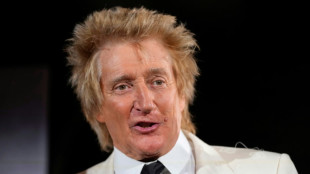 Raspy-voiced hit machine Rod Stewart turns 80
Raspy-voiced hit machine Rod Stewart turns 80
-
Trade war worries loom over Las Vegas tech show

-
 America mourns former president Jimmy Carter at state funeral
America mourns former president Jimmy Carter at state funeral
-
Djokovic handed tough Australian Open draw, Sinner faces Jarry test

-
 Bok prop Nche wary of Dupont threat in Champions Cup
Bok prop Nche wary of Dupont threat in Champions Cup
-
Conceicao brings good vibes back to AC Milan after Super Cup triumph

-
 'We have lost everything': Despair in the Los Angeles fires
'We have lost everything': Despair in the Los Angeles fires
-
Australia frets over Meta halt to US fact-checking
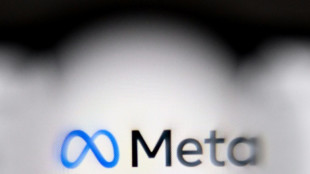
-
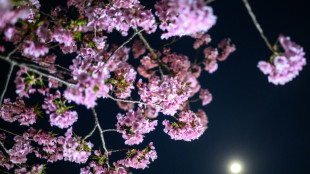 Japan startup hopeful ahead of second moon launch
Japan startup hopeful ahead of second moon launch
-
Ukraine allies to hold last defence meet before Trump takes office

-
 NBA-best Cavs win 11th in a row to end 15-game Thunder streak
NBA-best Cavs win 11th in a row to end 15-game Thunder streak
-
What you need to know about HMPV

-
 Bangladesh garment industry rebounds, but workers say little change
Bangladesh garment industry rebounds, but workers say little change
-
Asian markets drop as trades fret over US inflation, rates outlook

-
 Mozambique opposition leader due home amid tension over disputed vote
Mozambique opposition leader due home amid tension over disputed vote
-
Doping and a match made in heaven: Australian Open storylines

-
 Australia recall McSweeney for Sri Lanka Tests, Connolly set for debut
Australia recall McSweeney for Sri Lanka Tests, Connolly set for debut
-
Myanmar military adopts anti-junta fighters' drone tactics

-
 Lebanon set to finally elect president after two-year vacancy
Lebanon set to finally elect president after two-year vacancy
-
New twist in US-Cuba trademark fight over Havana Club rum

-
 CES tech looks to help world's aging population
CES tech looks to help world's aging population
-
Rubber tappers forge sustainable future in Amazon
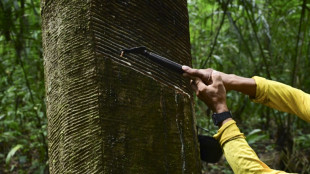

New twist in US-Cuba trademark fight over Havana Club rum
One rum, two owners: the decades-long legal battle between the Cuban government and spirits giant Bacardi over the popular Havana Club rum brand has entered a new phase with the enactment of a new US trademark law.
Entitled "No Stolen Trademarks Honored in America Act" and signed into law last month by outgoing US President Joe Biden, it prohibits US courts from recognizing trademarks that were "illegally confiscated" by the Cuban government since the 1959 Cuban Revolution.
The law cements Bacardi's rights to Havana Club and could prevent Cuba's state-owned Cubaexport and its French partner, beverage giant Pernod Ricard, from asserting their rights to the brand in the United States.
While Cuba currently cannot export its rum to the United States because of a decades-long trade embargo, the government in Havana and Pernod Ricard believe that maintaining trademark rights to the iconic drink is important in case restrictions are lifted.
The law, which was championed by incoming Secretary of State and Cuba hardliner Marco Rubio, was swiftly criticized by the government of the Communist island, which said that it violates international norms.
"Once again, the United States government provides space for the dark interests of the most aggressive anti-Cuban sectors whose manipulation of the American political system has become a practice," the government said in a recent statement.
Bacardi, which was exiled from Cuba after the country's Communist revolution, says that the Cuban government unlawfully seized rum distilleries and the Havana Club brand from its founder Jose Arechabala SA in 1960.
But the Cuban government has maintained its rights to the brand and has marketed Havana Club worldwide, with the exception of the United States because of the embargo Washington imposed in 1962.
In 1976, Cuba managed to assert its rights to the brand in the United States, until Bacardi contested it in 1995 and started selling its own rum in the United States under the Havana Club brand.
- Booming market -
The legal fight is unlikely to subside because the rum industry is booming.
According to a recent report by Dublin-based consultancy Research and Markets, the global rum market is expected to grow at an average rate of 7.7 percent per year over the next six years, jumping from $19.1 billion in 2024 to $32.2 billion by 2031.
In 2016, the United States Patent and Trademark Office (USPTO) renewed Cubaexport's registration of the Havana Club brand for ten years, but the enactment of the law is likely to complicate its renewal in 2026.
John Kavulich, director of the New York-based Cuba-US Trade and Economic Council described the law as "an immensely cost-effective" lobbying effort for Bacardi.
"Most significantly was the complete lack of opposition -- even from the most vocal members of the United States Congress who support commercial, economic, financial, and political re-engagement with Cuba," Kavulich said to AFP.
After the brief thaw in US-Cuban ties that began under Barack Obama (2009-2017) and the strengthening of sanctions during Republican Donald Trump's first presidency (2017-2021), which largely remained unchanged under Democrat Biden, tensions with Havana could rise further under Trump's second term.
M.Gameiro--PC
